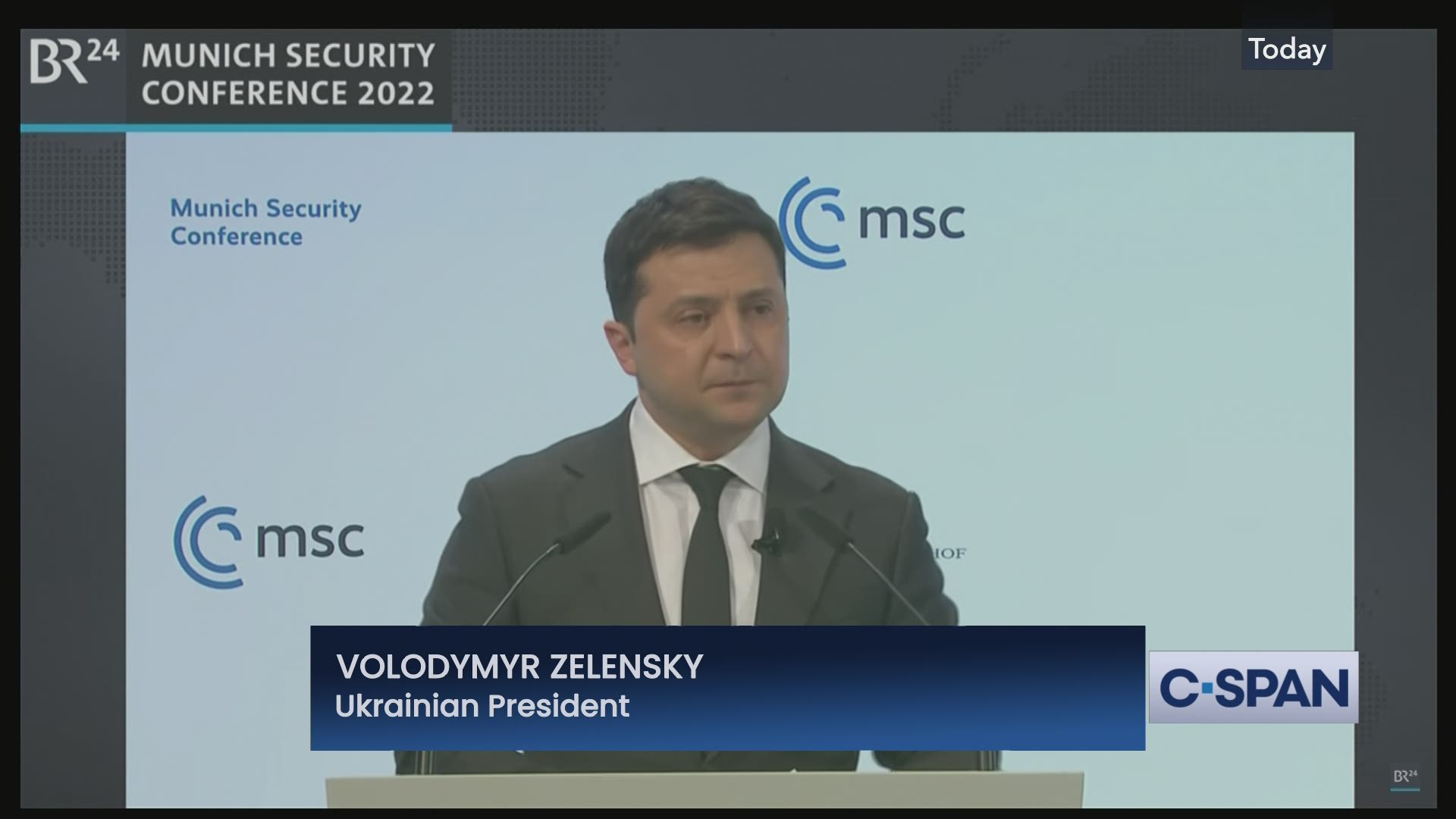
Ukraine’s President Volodymyr Zelensky has said that almost daily predictions of an imminent Russian invasion of his country were imposing economic costs by terrorizing his people, crushing his currency and scaring off investors.
His lament came among repeated calls at Saturday’s Munich Security Conference for a diplomatic solution to the crisis with Russia. It followed President Joe Biden’s televised speech on Friday saying that Russia’s Vladimir Putin has already decided to launch an invasion within days. “We believe that they will target Ukraine’s capital, Kyiv, a city of 2.8 million innocent people,” Biden said.
Eyewitness accounts (including this correspondent last week) suggest that the capital city of Kyiv and the second largest city of Kharkiv, located just 26 miles from the border with Russia, were stoically calm and peaceful. People are well aware of a possible invasion but seem to think that diplomacy will work.
This was the first time Biden was so definitive in his prediction based on American intelligence estimates. US officials said Russia has about 190,000 troops near Ukraine, nearly twice the number in January. Russia denies any plans to attack its neighbor.
Zelensky sounded frustrated. “We cannot say on a daily basis that war will happen tomorrow’’ (since nothing is 100% certain), he said. “Just putting ourselves in coffins and waiting for foreign soldiers to come in is not something we are prepared to do.”
“We are ready to look for the key to the end of the war in all possible formats and platforms: Paris, Berlin, Minsk. Istanbul, Geneva, Brussels, New York, Beijing – I don’t care where in the world to negotiate peace in Ukraine” he declared.
“It does not matter if four countries, seven or a hundred participate, the main thing is that Ukraine and Russia are among them,” reminding the Western leaders gathered in Munich that Putin has refused to meet him directly so far.
“And I hope no one thinks of Ukraine as a convenient and eternal buffer zone between the West and Russia. This will never happen,” Zelensky insisted.
US Vice President Kamala Harris noted that “Russia continues to claim it is ready for talks, while at the same time it narrows the avenues for diplomacy. Their actions simply do not match their words.”
The US and its allies have said they will impose swift and devastating sanctions on Russia, including on persons complicit in the invasion of Ukraine, on financial institutions and western technology exports to Russia.
Russia usually attends the annual security conference in Munich but boycotted it this time.
Putin expects support from President Xi Jinping for his aggressive saber rattling against Ukraine, the US and Europe. But in a virtual appearance, Chinese foreign minister Wang Yi was circumspect. He noted that Ukraine’s “sovereignty, independence and territorial integrity” should be safeguarded.
Europe’s three major military and economic powers, Britain, France and Germany, are standing solidly behind Biden’s plans to impose draconian sanctions against Russia if it invades Ukraine. British Prime Minister Boris Johnson was the most outspoken saying Russia “must fail and be seen to fail” if it invades Ukraine.
G7 foreign ministers chaired by Germany’s Annalena Baerbock expressed solidarity with Biden. “We are facing the unimaginable concrete threat of a military conflict at the heart of Europe,” she said, but admitted that she did not know if “an attack was a done deal”.
Any breach of Ukraine’s borders would trigger sanctions, she warned but did not clarify whether all the sanctions would come crashing down on Russia immediately. Unlike the impression given by the White House, she seemed to suggest that there could be different trigger points.
French President Emmanuel Macron was not in Munich but is working feverishly alongside German Chancellor Olaf Scholz to defuse the crisis and prevent a Russian incursion.
Both also fear the political cost to their own governments of failure to de-escalate the crisis. They fear social unrest and anger on their streets since the planned widespread economic sanctions on Russia would almost immediately hurt the livelihoods of their citizens as well.
Zelensky said he spoke urgently on the phone to Macron on Saturday to discuss ways of quickly reaching a diplomatic settlement.
















